I remember feeling frustrated every time I reached for a glass of tap water, second-guessing whether it was actually safe and clean. You know that nagging doubt too, right?
I needed a solution that combined reliability, excellent filtration, and a user-friendly design—something that would let me skip constant runs to the store for bottled water. That’s why I turned to the Purewell water filter system.
If you’re on the fence about which filtration system to get, I’ll share my personal experience and analysis so you can feel confident choosing Purewell. Trust me, it’s a choice that can elevate your water quality immediately.
Why I Chose The Purewell Water Filter System?
When I was scouring the market for a solid water filtration system, I had a couple of key criteria in mind. First, I wanted something that would genuinely give me peace of mind about the water I drink every day.
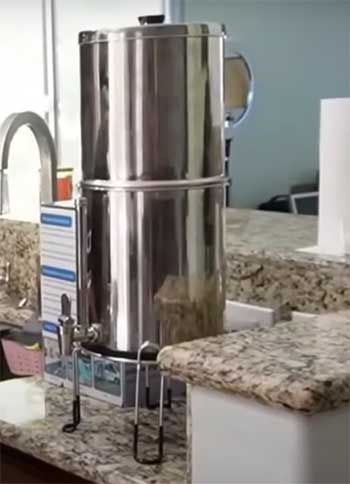
Water should be refreshing, odor-free, and free of the suspicious stuff that can upset my stomach or create a long-term health risk.
I’m pretty sure you feel the same way, right?
We don’t just drink water to stay hydrated; we want it to actually taste good and be good for us.
I’ve had my share of disappointments in the past.
Some filters looked great on paper but were a pain to maintain or slowed down to a trickle after just a month.
Others made big claims but didn’t live up to them. This time, I wanted something that wouldn’t leave me regretting my purchase a few weeks in.
This is where the Purewell system entered the picture. The moment I started reading about its specs—like the 0.01-micron filtration, the three-stage technology, the NSF certifications—I began to feel this could be a game-changer.
On top of that, real users seemed genuinely thrilled with its performance. Some had sensitive stomachs and claimed Purewell’s water caused them zero upset, while others praised its simple setup and cost-saving benefits.
Now that I’ve used it for a while, I can say that my trust in it has only grown. The water tastes clean, crisp, and free of weird odors. It feels like I’ve found that sweet spot between excellent filtration and user-friendliness.
Understanding The Filtration Technology and NSF Certification
I’m a bit of a stickler for knowing how things actually work, and I want you to have that clarity too. The Purewell system uses a three-stage filtration process.
Essentially, the water passes through a hollow fiber UF membrane, a silver ion membrane, and finally, an activated carbon block. This setup isn’t just marketing fluff; it has authoritative NSF/ANSI 42 and 372 certifications to back it up.
The 0.01-micron pore size is impressive. Most competitors have pores around 0.2 microns, so right away you know Purewell is doing a more thorough job.
Tiny contaminants—sediment, rust, organic matter, and even some heavy metals—get trapped. As someone who’s pretty conscious about my health, having a filtration system that ensures I’m not ingesting those microscopic nasties is a huge comfort.
I also appreciate that Purewell highlights its certification status. Too many products throw around fancy terms without proving they meet industry standards. With Purewell, you know they’ve met the benchmarks that matter.
From an analytical perspective, the certifications tell me they’re not just making claims; they’ve gone through real testing and can stand behind their filtration quality.
The Taste and Flavor Difference
Let’s be honest: taste is a big deal. I’ve tasted filtered water that ended up having a strange aftertaste or just felt “off.” That’s a deal-breaker for me because I don’t want to force myself to drink water that’s supposedly pure but tastes weird.
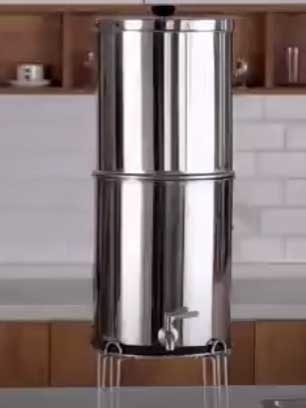
After all, if you’re going to invest in a filtration system, you deserve water that’s genuinely pleasant and refreshing.
Purewell’s water tastes clean and crisp—like the best bottled water you’ve had, minus the plastic.
There’s no chlorine smell and certainly no chemical weirdness lingering in each sip.
If you’re worried that it’ll take time to adjust, let me say that I got used to it almost immediately.
The improvement over my tap water was so noticeable that I never felt I had to “get used to” anything.
This is especially important if you’ve got kids or guests who are picky about their water. I can confidently hand them a glass and know they’ll enjoy it.
The Design, Build Quality, and Aesthetic
I know that aesthetics might sound superficial, but when something is going to live on your kitchen counter, it matters. The Purewell system features a 304 food-grade stainless steel housing.
It’s sturdy yet not clunky, and it actually looks kind of stylish. It manages to strike a balance: it’s functional without looking like an eyesore.
The stainless steel spigot fits snugly, so you’re not dealing with the annoyance of leaks and drips. And I really appreciate the non-slip stand. Without it, you’d have to worry about the unit sliding around or scratching your surfaces.
Everything about it feels thoughtfully designed. It doesn’t feel flimsy; it feels like something that’s meant to last. The housing might be thinner than some super high-end brands, but for the price, it’s more than durable enough. Just handle it with a bit of care and you’re good to go.
The Gravity-Fed Advantage (No Electricity Needed)
One of the coolest things about this system is that it runs entirely on gravity. No electricity, no moving parts, no complicated wiring. You just pour water into the top chamber and let the filters do their thing.
It’s a beautifully simple approach that makes it suitable not just for your kitchen, but for camping trips, off-grid cabins, or emergency situations.
I’ve used the Purewell filter in different scenarios: at home, where I have a stable electricity supply, and at a cabin that’s off the grid. In both places, it delivered consistent and reliable filtration.
There’s something satisfying about knowing you can depend on this thing, even in a power outage. Plus, gravity filtration is pretty energy-efficient since it uses zero electricity. That’s an eco-friendly bonus on top of everything else.
Pros And Cons of The Purewell Water Filter
Let’s break it down. I’ve done a fair bit of experimenting, and here’s what stands out to me:
Pros
- Exceptional Filtration: It removes 99.99% of tiny particles and contaminants thanks to the ultra-fine 0.01-micron filter pores.
- Certified Quality: NSF/ANSI 42 and 372 certifications ensure you’re getting a proven product.
- Great Taste: You won’t have that weird aftertaste. The water tastes crisp and fresh.
- No Electricity Required: Perfect for off-grid use and eco-conscious individuals.
- Sturdy Build: The 304 stainless steel housing and well-fitted spigot feel durable and leak-free.
- Good Flow Rate: About 4 gallons per hour. For gravity-fed filtration, that’s pretty efficient.
- Long Filter Life: Each pair of filters lasts up to 6000 gallons. Replace them every six months for the best performance.
Cons
- Initial Flavor Adjustment: A few people mentioned they needed to get used to the taste. While I didn’t personally have this problem, it’s worth noting that taste is subjective.
- Thin Housing: The stainless steel shell, while durable enough, is somewhat thin. You just need to be careful not to dent it.
- Not TDS Reduction: The filter doesn’t lower TDS (Total Dissolved Solids), which might matter if you’re specifically looking for that feature.
Setting Up And Using the System At Home
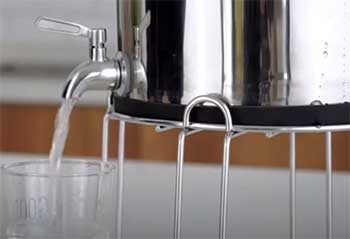
Setting up the Purewell system is straightforward.
You’ll just assemble the upper and lower chambers, install the filters according to the instructions, and prime them if necessary.
It might take a bit of time to get everything set just right the first time, but trust me, it’s easier than you think.
Within half an hour, you can be up and running.
It’s also smart to place it somewhere accessible. If you have a stand, use it. Keeping a pitcher nearby to top it up as you go is a good habit. The manufacturer warns against overfilling, so I usually keep an eye on the water level.
Whenever I take out a pitcher of filtered water, I’ll replace that amount in the top chamber. This helps maintain a steady supply without causing overflows.
If you’re using it outdoors or in a cabin, consider placing it somewhere stable, out of direct sunlight if possible. The stainless steel finish looks good, but you want to keep it from getting too hot or scuffed up.
One more tip: if the filtration slows down, it might mean the filters need a quick scrub or it’s time for a replacement.
Maintenance Tips For Optimal Performance
To keep your Purewell system running smoothly, you need to pay attention to a few basic maintenance steps. I’ve learned these from personal experience:
- Regular Cleaning: Every couple of weeks, give the chambers and the spigot a gentle scrub. Nothing fancy—just mild soap and warm water. This prevents buildup and keeps things fresh.
- Filter Scrubbing: The black carbon filters can occasionally get clogged with sediment, which may slow down the filtration. A gentle scrub with a non-abrasive pad under running water can help. Just be careful and follow the manufacturer’s instructions. Don’t use harsh chemicals; you don’t want to compromise the filter’s effectiveness.
- Prompt Replacement: Even though each set of filters can last up to 6000 gallons, replacing them every six months is a good rule of thumb. Water quality and usage vary, so you might need to replace them sooner if you notice the flow slowing down or a change in taste. Don’t push filters beyond their recommended lifespan. Your health and comfort depend on their efficiency.
- Avoid Overfilling: Stick to the guidelines. If the bottom chamber is full, don’t keep pouring water into the top. This can cause leaks and wasted effort. Just add as much water as you need and top up as it’s filtered.
- Store Responsibly: If you’re not going to use the filter for a while (like when closing up a cabin for the season), clean and dry everything thoroughly before storage. This prevents mold or mildew from developing.
Following these simple tips will ensure you get the most out of your investment. Trust me, a little effort here and there goes a long way in maintaining top-notch filtration quality.
Comparing Purewell To Other Water Filters
- Purewell Vs. SpiroPure Water Filter
When I weighed Purewell against SpiroPure, one of the first things I noticed was their differing filtration focuses. SpiroPure often emphasizes removing chemical flavors and smells, which is great if you’re mostly worried about chlorine or that metallic tang.

However, Purewell’s super-fine 0.01-micron filtration level generally tackles a broader range of microscopic contaminants.
That means you’re likely to get fewer particles slipping through, which can lead to cleaner-tasting water in the long run.
SpiroPure filters are known to be user-friendly and somewhat more straightforward to replace.
On the other hand, Purewell wins points for its gravity-fed design—no electricity needed—and its certified components.
If your priority is a robust filtration performance and NSF-backed credibility, Purewell may feel like the safer bet. But if quick changes and a simpler filter design matter more to you, SpiroPure could have the edge.
- Purewell Vs. Waten Water Filter
Waten filters are praised for their affordability and user-friendliness. They’re typically easy to install, making them appealing for those new to water filtration. If you don’t want to spend too much upfront, Waten can be tempting.
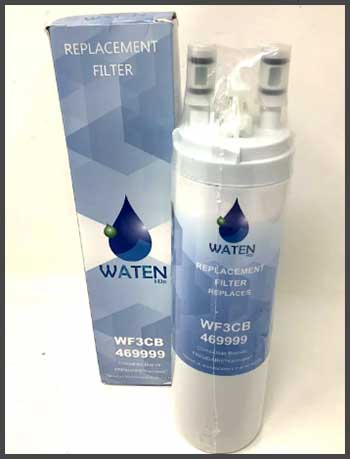
But it’s worth thinking about the quality and thoroughness of what you’re getting.
While Waten focuses on making clean water accessible and straightforward, Purewell offers a more advanced filtration system with its three-stage setup and ultra-fine pores.
Another difference is the overall build quality. Waten solutions often rely on plastic components, which can be fine for short-term or casual use.
Meanwhile, Purewell features a stainless steel chamber, offering a more durable, long-lasting structure.
If you expect to use your filter system daily, for years, or in a wide range of environments—like at home and off-grid—Purewell’s sturdier construction could pay off. In short, Waten may win on initial price and simplicity, but Purewell comes out ahead if you’re after something more durable and thorough.
- Purewell Vs. Berkey Water Filter
Berkey is a heavyweight in the gravity-fed filtration world, with a long history and a dedicated following. Many people trust Berkey for its proven track record, which can make it feel like the safe, classic choice.
But when I compared it to Purewell, I found some noteworthy distinctions that might tip the scales depending on your priorities.
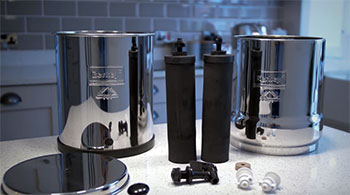
First off, Purewell’s filters boast a smaller pore size at 0.01 microns, compared to many Berkey filters that come in at around 0.2 microns.
This suggests Purewell filters out finer contaminants.
If you’re the kind of person who wants to be certain that your filter is catching even the tiniest particles, Purewell might hold an advantage.
Additionally, Purewell highlights its NSF certifications right up front. While Berkey has a solid reputation, some users prefer the extra reassurance of recognized, standardized testing and approval.
Berkey systems can sometimes cost more, and their replacement filters might feel pricey over time. Purewell, on the other hand, tends to offer a better balance of price and performance.
You get similar gravity-fed convenience without always needing to pony up for premium brand name pricing. The stainless steel build and good flow rate of both brands are fairly comparable, but Purewell’s combination of finer filtration and certification-driven credibility can be compelling.
In essence, Berkey gives you a heritage brand that has stood the test of time, while Purewell delivers a modern twist—offering tighter pore filtration and NSF certifications. If you value an established name and don’t mind spending more, Berkey is a known quantity.
But if you’re looking for a potentially higher filtration accuracy and a more budget-friendly approach, Purewell might surprise you as the stronger contender.
Why Purewell Is A Worthy Investment?
If you break down the cost over time, investing in a solid water filtration system often makes sense. Bottled water is expensive and generates plastic waste.
Traditional home filtration systems that rely on electricity or frequent filter changes can become a hassle. With Purewell, once you’ve got it set up, you’re basically set for months at a time.
Consider the peace of mind factor as well. Knowing that the water you’re drinking is filtered through a system that’s NSF certified and capable of removing a wide range of contaminants is worth something in itself. Good health is priceless, and the small effort you invest upfront in choosing a high-quality filter pays dividends over time.
I used to hesitate before spending money on a filter. But after comparing what I spend on bottled water and considering the environmental impact, Purewell emerged as a logical, cost-effective solution. It’s not about a flashy gadget; it’s about a reliable, well-made tool that improves a fundamental part of your daily life.
- Adapting to Your Lifestyle
One of the things I love is the system’s versatility. You might live in a city apartment where tap water tastes a bit off, or in a rural cabin where you draw from a well of questionable quality. Maybe you just want a backup option in case of an emergency.
Purewell fits all these scenarios because it doesn’t depend on any external energy source and can handle a range of water qualities.
If you’re an outdoor enthusiast, consider bringing the Purewell system on extended camping trips. It might be heavier and bulkier than a small filter straw or bottle, but if you have a base camp, the convenience of fresh, filtered water at the ready is unbeatable.
At home, it’s an elegant solution. On the road, it’s a portable, reliable companion.
- Sustainable Choice
We can’t ignore the sustainability angle. By cutting down on bottled water purchases, you’re reducing plastic waste. Over time, this has a meaningful impact. Each time I refill my reusable bottle directly from the Purewell system, I think about how many single-use plastic bottles I’m not throwing away.
Gravity-fed systems are inherently energy-saving. They don’t rely on electricity, so their environmental footprint is lower than complex filtration systems that need constant power.
Combine that with the stainless steel build—something that can last years if treated well—and you’ve got a solution that’s kinder to the planet.
Frequently Asked Questions (FAQ)
Purewell’s black carbon filters can provide up to 6000 gallons of drinking water per pair. Typically, each filter element lasts around 3000 gallons. However, the actual lifespan can vary based on your water’s quality and usage patterns. As a general guideline, I recommend replacing them every six months for optimal performance. If you notice the flow rate decreasing or the taste changing, it might be time for fresh filters.
Yes, Purewell’s black carbon filter is NSF/ANSI 42 certified, and the system has also passed NSF/ANSI 372 certification. These certifications indicate that the product meets strict standards for material safety, structural integrity, and contaminant reduction. From my perspective, this third-party validation gives you peace of mind that Purewell’s claims are grounded in real testing and quality checks.
The Purewell gravity water filter system primarily targets chlorine, rust, sediment, organic matter, and certain heavy metals. Its three-stage filtration and 0.01-micron pore size ensure that it effectively removes 99.99% of tiny particulate matter. While it doesn’t reduce TDS or specific minerals, it provides clean, crisp-tasting water. If your main goal is to remove unpleasant odors, improve taste, and intercept microscopic contaminants, Purewell’s filtration is more than adequate.
This can be subjective, as the “best” brand depends on personal preferences, priorities, and budget. However, from my experience, Purewell holds its own against many well-known brands. It offers top-tier filtration at a reasonable price and is backed by solid certifications. While some may argue in favor of pricier brands with thicker steel housings or different filter technologies, I believe Purewell is a strong contender in terms of overall value, reliability, and taste.
Wrapping Up
If you’re ready to enjoy fresher, cleaner water every day without wrestling with complex filters or spending a fortune on bottled water, Purewell is a smart choice. I’ve appreciated how it balances price, quality, and convenience, all while delivering a taste that makes me want to drink more water every day.
Whether you’re at home, off the grid, or simply seeking a reliable filter, Purewell meets those needs. Trust me, once you experience the difference, you won’t want to go back to your old routine. Step up your water quality and make the leap to Purewell.
It’s well worth it.
